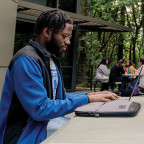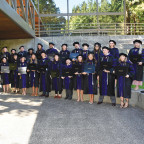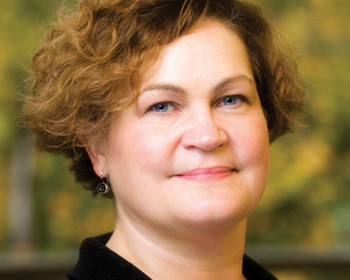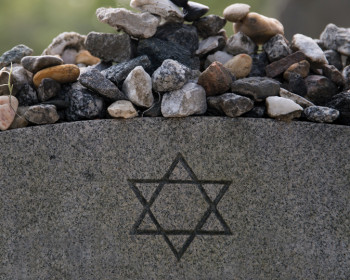The Enduring Impact of the Roosevelt Robinson Minority Scholarship
Roosevelt Robinson Minority Scholarship
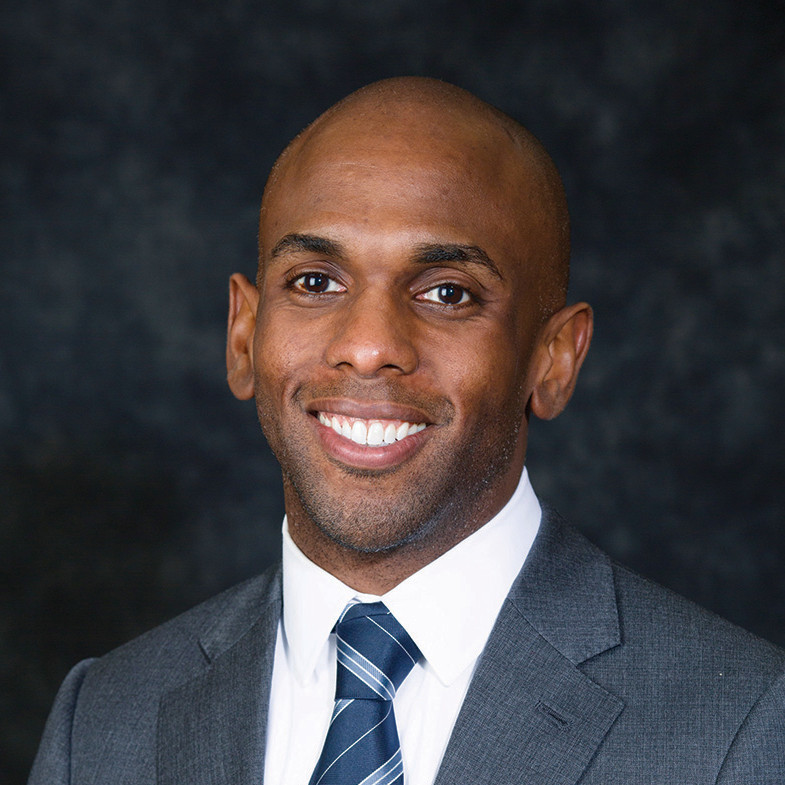
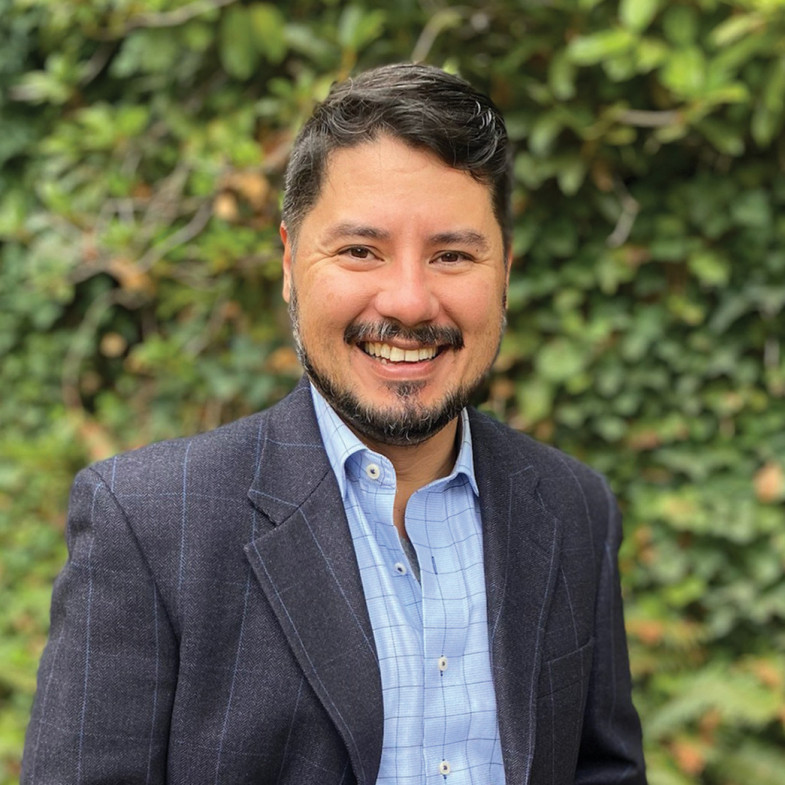
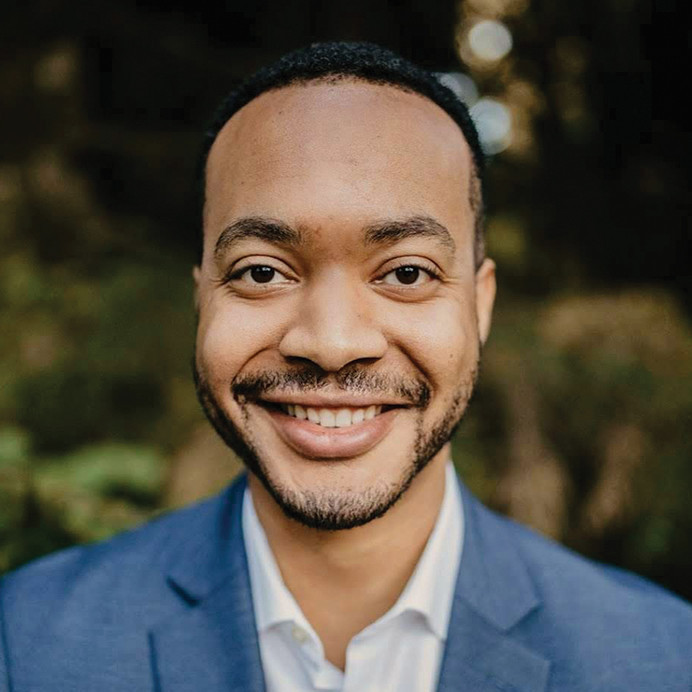
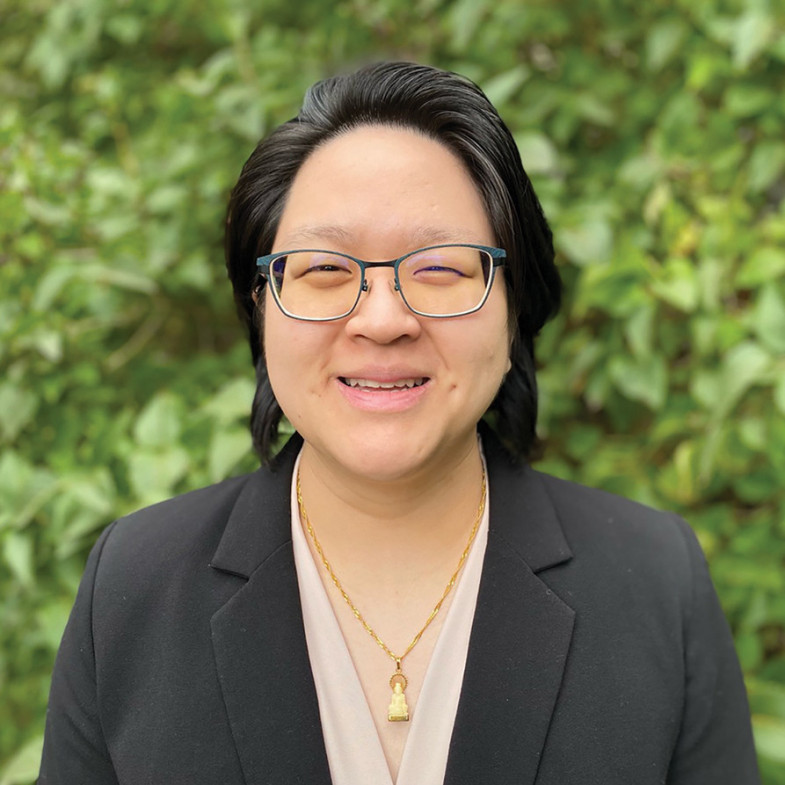
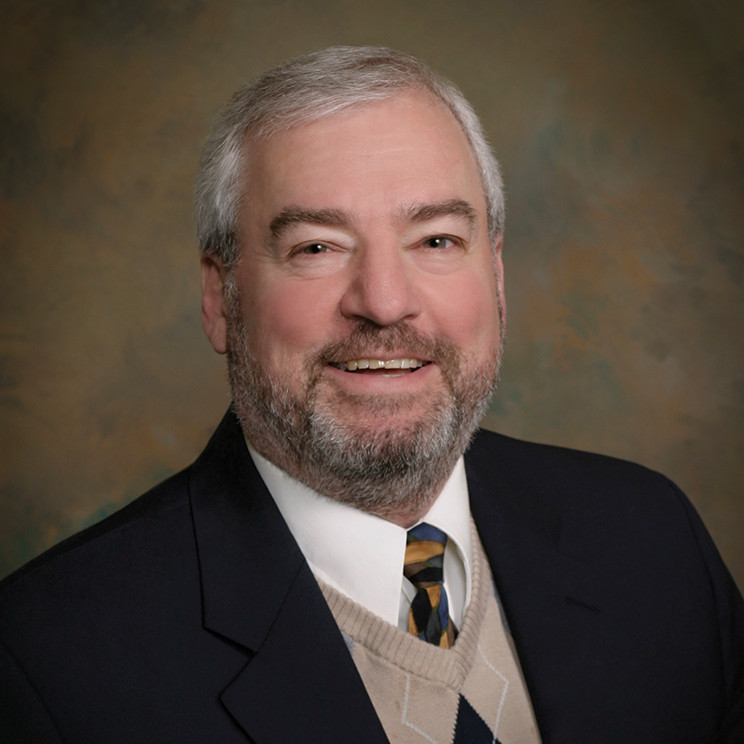
As a community leader, former prosecutor, respected judge, and beloved friend, the Honorable Roosevelt Robinson ’76 touched the lives of many and set a sterling example of legal professionalism in public service.
To honor his legacy of inspiring ordinary people to do extraordinary things, his friends and colleagues established the Roosevelt Robinson Minority Scholarship in 2004, dedicated to increasing diversity in the Oregon legal community.
Today, Victor Hugo Mercado ’15 and Mark Kimbrell ’14— past recipients and current members of the scholarship committee—are leading an effort to raise additional funds for the scholarship.
Mercado moderated a discussion with three recipients and one of the fund’s founders to discuss the impact of the scholarship and the need for more diversity in the law.
Mercado:
Why is diversity important in the law?
Kline:
We need people in the legal profession to look like the community they’re representing. It promotes the public’s perception of an equal and fair judicial system, to the extent an individual feels that their attorney understands and is listening with an empathetic ear.
Diversity is not only about race and sexual orientation, it’s also about our experiences. Judge Robinson referred to himself as economically depressed, but academically qualified. Socioeconomic diversity is also very important. For many years, the legal field has been perceived as a wealthy person’s profession.
Nguyen:
By and large, the legal system was built by and for white, straight, cisgender, Christian, able-bodied men, and it does not adequately serve those considered “others.” Diversity in the law is a step toward changing a system that affects a very diverse group of people but that, at its origin, did not contemplate many of those people’s needs. But it’s not simply diversity for diversity’s sake. Just because a person identifies a certain way or checks a certain box does not necessarily mean that they fight for a certain people or will further a certain cause, and calls for diversity in any field or profession should come with the nuanced recognition that representation alone cannot be our end goal, if we are to make meaningful change.
Mercado:
I want to dig deeper into why diversity is important in the law based on your personal experience.
Nguyen:
I am a gender-nonconforming woman of color, child of refugees, first-generation American-born, and English was my second language. Basically, I check multiple of the “diversity” boxes. I grew up isolated from and not represented by the dominant culture in Portland, Oregon. My wanting to go to law school came from intimately understanding the lack of power that comes with those experiences.
I want to harness the power of the law, to empower myself with that tool, and to transmit that power back to my communities. I think that self-empowered individuals and communities are important, so that people don’t have to rely on others to have their inherent dignity and integrity recognized. For example, I wish for a day when my job as a poverty law attorney would no longer be needed because poverty no longer exists and people don’t need someone with a law degree just to obtain basic human necessities such as food, shelter, and safety.
Kline:
Often we are the one and only diverse person in the room. At Lewis & Clark, however, I was not the only Black law student. Lewis & Clark has a commitment to diversity through its scholarship program and other areas. I’m directly contributing to that effort each month—it’s very important work.
I didn’t grow up knowing a lawyer. I grew up without means, and I’m first in my family to go to law school, and to graduate from college, certainly. To Diane’s point, it would be great if, one day, I’m not the one and only Black deputy attorney general in my section, or one of the few lawyers of color in the environmental area, where I did my LLM.
It’s never been more important to see people that look like you. For me, environmental justice is very important. I would like to see environmental law become a more diverse field. The next frontier is to get more people of color and more people of diverse experiences and backgrounds involved in some of these other areas that have been, sort of, closed off to people of varying backgrounds.
Myers:
Growing up being one of the few Black people in my community, I personally saw some of the disparate impacts that the laws currently have and always had towards people like me. It fueled an interest initially in me to get involved in criminal law or civil rights.
As an appellate attorney, I’m directly involved with things that affect the law in Oregon. And I feel really honored to be a part of that. My lived experience can help in some circumstances because, for instance, I can delve deeper into what a witness is saying in a cold record. If you’ve interacted with a certain community and can relate to that community, you can tease out certain inferred potential meanings in testimony, which can actually help push the law in a more equitable way.
In Oregon, I am one of only a few Black men doing appellate work, unfortunately. To Brandon’s point, it would be great to have more diversity in the appellate bar specifically, so you can get that type of outlook and viewpoint to effectuate the law in the unique way that you can as an appellate attorney.

In addition to receiving the Roosevelt Robinson Memorial Scholarship, alumni featured in this article received one or more additional scholarship support including: the Dean’s Scholarship, Trillium Grant, Andrea Swanner Redding Scholarship, Alumni Board of Directors Scholarship, Keller Law and Entrepreneurship Scholarship, Candise DuBoff Jones Endowed Scholarship, and the Robert B. Pamplin Sr. Scholarship.
Mercado:
What are the obstacles and changes that you see happening in the Oregon legal community and in the broader legal community?
Myers:
I’ve really seen a positive shift toward openness and willingness to hear diverse viewpoints in the law. As we continue to push as a community to be better and diversify—racially, culturally, and in viewpoints—we can slowly bring down some of those obstacles that exist.
Kline:
One barrier that I personally experienced was the lack of access to a professional network. One of the reasons the legal profession is not as diverse is because it’s about who you know.
If there isn’t the ability to make those connections to the Oregon Bar in a way that’s authentic, then it’s just not going to happen. Beyond diversity initiatives that the law firms are doing, creating ways for authentic connections would be helpful.
Tauman:
Roosevelt was very much committed to diversity. When he graduated in 1976, there were very, very few people of diverse backgrounds practicing law.
He lamented that. And quite frankly, he was not happy with the quality of the Black lawyers that he saw. He was interested in having a curated process by which people of goodwill who were committed to diversity could help those who had great promise for being a successful lawyer.
When Roosevelt was honored in 2001 with the law school’s Distinguished Graduate Award, he gave the shortest acceptance speech on record: “Working for diversity is a virtue but it is not just a virtue; it is a necessity for survival.”
In Roosevelt’s mind, though, it was not just about diversity. It was having quality minority representation in the bar.
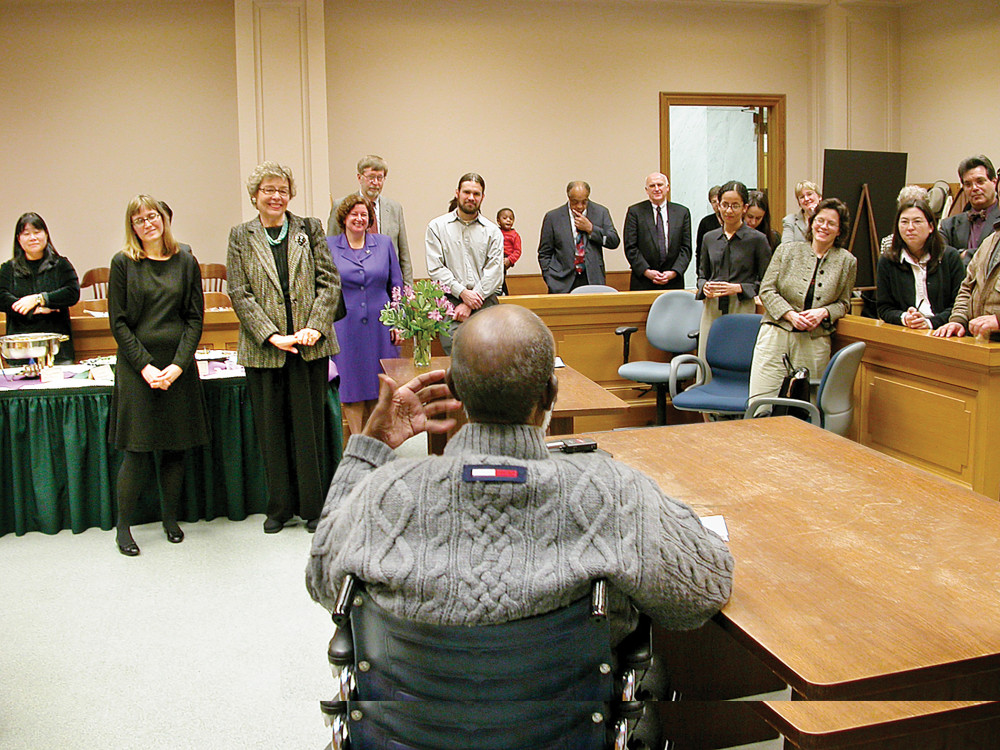
Mercado:
How did you feel when you found out you received the scholarship?
Nguyen:
One of my feelings was a sense of relief. But more meaningfully than the financial relief, I felt moral support and a reinvigorating sense of validation. Law school was a challenging and foreign journey that I undertook for idealistic but perhaps underdeveloped forethought, and I had no idea how to gauge how I was doing.
The selection committee’s encouragement in giving me the scholarship was humbling, timely, and very much appreciated. It’s as though they were saying that I was doing at least something right, and that I should continue.
Myers:
I battled throughout law school with imposter syndrome. I didn’t know what it took that first year to study for exams and just do some of the work that’s necessary in law school. So when I found out I received the scholarship, I was excited and I was relieved.
I was excited because the person who called me was Oregon Supreme Court Justice Nelson, and it helped to mitigate some of that imposter syndrome.
It also opened up an opportunity for me to take advantage of an unpaid summer internship at a small firm doing public- interest-minded work, but I was able to do that because of the scholarship. That turned into a paid opportunity at that firm, which translated eventually into this position that I’m in now as an appellate attorney.
Mercado:
As someone who sits on the committee now, [I know] we try to give people that boost. We don’t always pick a student from the top 10, the one who’s getting all the scholarships and is knocking it out of the park. We’re really looking for those diverse candidates who are on the bubble. We want to give them that affirmation, to say that their voice is important, and that it’s important for us to keep diverse populations in the community, that we want them to keep going.
Now we are trying to renew a push for more funding for this scholarship. We want to provide more financial assistance to diverse candidates. What would you say to a potential donor about the impact of this scholarship and why it’s important to donate to the Roosevelt Robinson Scholarship fund?
Kline:
For me, the reason I donate to the law school through the diversity and inclusion fund is because I want to reach back and pull other people up the way that the Roosevelt donors did for me. Given what we’re going through right now, it’s important to have the law school reflect the diversity of the world we are going out into. We should be growing that endowment as big as we can so that we can try to confront some of the issues that we are seeing in the world today.
Myers:
When you get that type of connection that comes from a scholarship like this, you are able to kind of envision a new future that you may not have otherwise envisioned. And for me, it opened doors that I didn’t anticipate would even exist, let alone open for me. It’s a tremendous way to make future lawyers who are mindful of the issues we talked about and who can strive to do things that our predecessors haven’t been able to do.
Mercado:
Chuck, as someone who’s been intimately involved in the scholarship for many, many years, including as a long-term donor, how would you convince a donor about the impact of this scholarship?
Tauman:
Your stories of impact are the greatest assets in persuading people like me to make significant contributions. You are the people who represent all of the positives of the scholarship program, and your successes show people that this is an investment that pays off.
The scholarship was established the year before Judge Robinson died. In the last year of his life, Roosevelt was so proud of the scholarship at the law school, and it was a wonderful series of events that allowed us to begin the scholarship during his lifetime. It’s one of the best things I’ve contributed to in my life. You should all be very proud that you have the name of Roosevelt Robinson on your resume, and be proud of who you’ve become today.
“As past recipients of the Roosevelt Robinson Scholarship, we have personally experienced the impact of this fund. In this moment of cultural reckoning, we felt a call to extend Judge Robinson’s legacy. Our goal is to raise an additional $220,000 in order to double this endowed fund by 2024! You can help us get there by making a gift today! Thank you for your consideration.”
Mark Kimbrell ’14 and Victor Hugo Mercado ’15 Cochairs, Roosevelt Robinson Minority Scholarship Committee
Supporting Students
Points of Pride
Commencement
Supporting Public Interest Students
2021 Mentor/ Mentee Awards
Judges Reflect at Martin Luther King Jr. Event
More Advocate Magazine Stories
email jasbury@lclark.edu
voice 503-768-6605
Judy Asbury, Assistant Dean, Communications and External Relations
Advocate Magazine
Lewis & Clark Law School
10101 S. Terwilliger Boulevard MSC 51
Portland OR 97219
